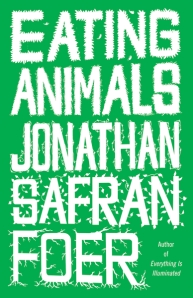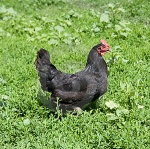You wouldn’t think a nonfiction book some laud as the next vegan Messiah tract would interest a novelist and self-proclaimed carnivore like me. But I got such a kick out of Patrick Brown’s recent Vroman’s blog posts (“Eating Animals 1, 2 & 3”) that I had to do supplementary Googling on Jonathan Safran Foer’s book Eating Animals. What I found further peaked my curiosity—both regarding the book’s content and form.

First off, let me explain my admittedly strange and unstructured consumption rules. While I am a meat-lovin’ lady, I’m prejudiced. Not all meat is created equal. Two years ago, I watched the film “Fast Food Nation” and simply couldn’t stomach beef again. If you’re a hamburger grilling, meat pie baking, filet mignon searing, I-want-it-bloody-rare individual, run from this movie! Because I guarantee you won’t be the same after watching. My husband, for example, hasn’t seen it. His Carl’s Jr. Six Dollar Burger is too dear. However, I’ve officially sworn off beef. I haven’t had a bite of Bessy in over twenty-four months. To be fair, I wasn’t huge on red meat to begin with. I’ve always favored fish and poultry. Pork, on occasion. (Note: I’m from Virginia. Barbecue a pig over coals, and you’d better hand me a bib.) So those are my basic meat guidelines.
On the grander scheme, my husband and I try to eat as organic as possible. For us, this translates to seeking out local produce and products. Not an easy task when you’re living in the desert. While El Paso is a mecca of chili peppers and pecans, it’s hard to find a large variety at the farmer’s market, particularly when it comes to proteins. I admit: We shop the grocery store for meat. I don’t know if the chicken in my Costco wholesale pack is free range, ethically raised and organic. What I do know is that we’re in a recession and for $2.99/lb., I can put dinner on the table. That’s an enticing deal. Does this label me a lazy, shameful, consumer of mass killings? Maybe so. But that’s one of the attributes I admire in Foer’s book: He doesn’t appear to be Mr. Perfect. He professes to being a man in the middle seeking a healthy compromise. This Thanksgiving, if I could readily buy an organic turkey that just had its last frolic on the grassy range without it equaling the cost of one month’s electricity, I would! And I believe most Americans feel similarly. We get that organic farming is healthier, better for the environment, the animals and our bodies.
As the granddaughter of farmers, I champion the global agricultural community. My grandpa’s farm in Puerto Rico not only grew tobacco, sugarcane, and beans, but also raised chickens. In case you aren’t aware, Puerto Ricans eat a lot of chicken. When we had a pork, it usually came from a friend’s pig farm down the road. Fish, well, just drive to the coast and cast a line. So I come from people who lived off the land, legitimately. My filial palate was ‘free range’, ‘ethical’, and ‘organic’ before the terms came into vogue.

Growing up, my mom frequently told the tale, known to us now as “The Little Black Hen Story,” about a chicken she adored.
Once upon a time, there was a little black hen that my grandpa warned everyone in the family not to get attached because one day, it’d be on his plate. But every day, my mom and her sisters fed the bird, cooed over it, chased it round the yard and smoothed its feathers. One day, they came home to find the hen missing. By dark when my grandma called them in for supper, it was still nowhere to be found.
Miserable with worry, my mom sat down at the table.
“What’s wrong?” asked my grandpa.
“We can’t find the little black hen,” said my mom.
“I told you not to get too close to that chicken.” My grandpa spooned steaming arroz con pollo (rice and chicken) onto his plate and picked up a cooked wing. “Because here she is—tonight’s supper!”
All the children broke down in tears and went to bed hungry. To this day, my grandpa swears it was one of the tastiest chickens he’s ever eaten.
My mom cringes then laughs over the poor, little black hen. Decades later, she recognizes it was a necessary evil to sustain her family, and, while short, that chicken had an exceptionally good life in her care.
Standing over the store’s poultry bin, little gelatinous sarcophaguses, vacuum-sealed, boneless and skinless, I doubt each of these had it so good. Not that I want them to have had manis and pedis every Tuesday and a diet of bottled water and truffles, but I do believe we have a responsibility to treat all living creatures with compassion. They breath and feel. Perhaps not with the same cognizance as humans, but the fact that they do at all should make us pause to appreciate their sacrifice and hopefully, support farmers who share the awareness.
On Amazon.com, Jonathan Safran Foer posted a video message explaining that our eating habits are “a series of choices—and very small choices… that have incredible resonance—more resonance than any choice that we make in the course of a day.”
I agree and applaud him for applying his storytelling craft to this topic. The book is a nonfiction narrative written like a novel, conversational, researched, funny and most importantly, free of nonfiction didacticism. The element of distinction: It’s Foer’s personal story of eating animals, not a treatise on it. Interesting.
My reading bent is fiction, but all the pre-chatter about this has me hooked. I may cruise over to my local bookstore tomorrow, cozy up in the corner with a copy, and see what else Mr. Foer has to say.
Yours truly, Sarah
P.S. Here’s the link to Patrick on Vroman’s Bookstore blog: http://blog.vromans.com


Sarah,
Thanks for writing such a thoughtful response to our series. It was exactly this sort of post we were hoping to elicit.
I’ve tried to eat less red meat — and actually, I’m like 3/4 vegetarian at this point, eating meat once a week, at most — and the way I see it, it makes triple sense: it’s better for you, health-wise, better for the environment (it takes a lot of oil and water to raise a cow) and it seems right ethically. I’ve never had a problem with eating meat — I don’t think it’s wrong to kill animals for food, but I do think it’s wrong to torture them first, which it seems like we’re doing with our industrial food system.
The financial burden that eating this way places on people is a real problem. The federal government continues to subsidize the worst of our food system, ensuring that the stuff that is the worst — for you, for the earth and for the animals — is what’s cheapest. I’m convinced that rather than obsess over the healthcare bill, we ought to be obsessing about the Farm Bill. It has a huge impact on all aspects of our lives and we continue to think it only effects folks in Iowa.
By: Patrick on November 10, 2009
at 7:33 pm
Patrick,
I’m glad you enjoyed my responding post. Thank YOU for the inspiration.
We’re definitely on the same page re: the federal government’s negative role in food production and mass distribution. Perhaps we should introduce all those folks on Capitol Hill to the noble end of a cattle prod. See how they like it.
Keep up the awesome job on Vroman’s Blog. It’s one of my favorites.
Yours truly, Sarah
By: Sarah on November 14, 2009
at 7:11 pm
I really don’t understand why people seem to be recoiling from our evolutionary nature. Human beings are omnivorous animals. In some cultures in among the very wealthiest people, it is possible to get a fully balanced, nutritious diet from non-animal products, but I see no reason to feel compelled to do so.
I will never have a problem with extracting nutrition, scientific knowledge, and medical benefits from the use of non-sapient species. I don’t believe that animals, whether they suffer or not, should be accorded special status.
By: Andrew Hazlett on November 10, 2009
at 7:55 pm
Andrew,
No recoiling here. I count every roasted chicken breast a blessing. I don’t propose glorifying animals, but I believe we are stewards of all living things on this planet. Yes, extract nutrients, knowledge, etc. from them, but we can do that with compassion and responsibility. No need to torture. No need to be careless and reckless because it’s easier. Again, what I champion about Foer’s thesis is the concept of making active choices as cultivators and consumers.
Thanks for adding to the discussion, Andrew. I love a good parley of ideas.
Yours truly, Sarah
By: Sarah on November 14, 2009
at 7:22 pm
I am a meat eater and do not apologize. However, I waste none! Even in the winter I buy bone in and make broth for soup. At least the poor lost soul did not leave us for nothing. Waste not, want not as our grandparents would say.
P.S. (it is my amateur opinion that we should eat meat with grissle, cartiledge in tact-it’s the same molecule folks, just like hormones. Why we are not as healthy bone, muscle wise, as we were. ?)
By: Jeanette Schuler on May 12, 2010
at 4:31 pm
I heard some Native American tribes used to explain to the (dead) animal why their life was taken and thank the animal for substenance.
By: Jeanette Schuler on May 12, 2010
at 4:34 pm